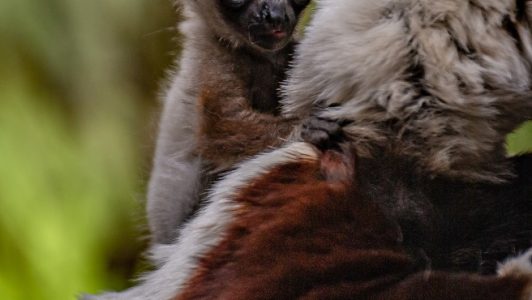Rare ‘dancing lemur’ born at Chester Zoo – EUROPEAN FIRST! #Blog
Victoria Hayes
10th February 2023

Conservationists at Chester Zoo become the first in Europe to successfully breed a rare Coquerel’s sifaka lemur.
The precious youngster arrived to parents Beatrice (10) and Elliot (10) – 18 months after the duo were translocated from the USA to Chester Zoo to begin a vital new conservation breeding programme, designed to protect the crtically endangered primates from extinction.
Born with a thick fuzzy white coat and weighing just 119 grams, experts say the baby will cling tightly to mum’s belly for several weeks, before riding on her back like a backpack until around six months old.
Zookeepers will determine the sex of the tiny primate once it starts to branch away and explore on its own.
Sifaka are distinguishable from other lemurs because of the unique way that they move. They maintain an upright posture and, using only their back legs, spring side to side along the floor and leap more than 20ft through the treetops in a single bound – this unusual motion has seen them nicknamed ‘dancing lemurs’.
Currently only seven of the rare primates are cared for in three zoos in Europe and the family trio at Chester are the only Coquerel’s sifaka to live in the UK. Conservationists at the zoo say the birth is a ‘landmark moment’ for the species that is on the brink of extinction in the wild.
Mark Brayshaw, Curator of Mammals at the zoo, said:
“It’s really exciting to be the first team of conservationists in Europe to successfully breed this unusual and extremely rare primate.
“While it’s still early days, both mum and baby are doing great. Beatrice is feeding her new arrival regularly and is keeping it nestled in her fur as she leaps from tree to tree. In a few weeks’ time, the baby will graduate to riding on her back, before branching out and learning to climb trees independently at around six months old. It won’t be long until this bright-eyed baby will be bouncing 20ft between tree to tree just like its parents.”
Found only in the treetops of northwest Madagascar, the Coquerel’s sifaka lemur population has suffered an 80% decline in just 30 years due to widespread deforestation. As a result, the world’s authority on the state of nature, The International Union for the Conservation of Nature (IUCN), upgraded the species to it’s highest conservation priority in 2018 and listed the primates as critically endangered in the wild.
Mike Jordan, Director of Animals and Plants at Chester Zoo, added:
“The birth of a Coquerel’s sifaka in Europe is a real landmark moment for conservation and, importantly, has kickstarted the endangered species breeding programme in European zoos for the species – which could be the lifeboat that prevents them from becoming wiped out completely.
“Mass deforestation has swept across the island of Madagascar and it has lost up to 90% of its forests, taking with it thousands of species. But we refuse to let the devastation continue and our conservationists have helped our partners Madagasikara Voakajy – an NGO based in the heart of the island – to develop an official protected area spanning 27,000 hectares of forest, which is home to some of Madagascar’s most precious species.
“While the situation is now quite desperate, it’s the knowledge, skills and expertise gathered by experts at conservation zoos like ours that will play a vital role in preventing the extinction of highly threatened species, just like the Coquerel’s sifaka.”
Chester Zoo has been protecting habitats and the unique species in Madagascar for more than a decade. In 2015, the Malagasy government established The Mangabe New Protected Area, co-managed by the zoo’s field partners and the communities that live in the Mangabe region, providing a safe haven for nine species of lemur, as well as thousands of other threatened species living on the island.
Coquerel’s sifaka lemur facts
- The new baby was born on 19 December 2022 to mum Beatrice and dad Elliot
- Scientific name: Propithecus coquereli
- There are more than 100 species of lemur in Madagascar – the only place where lemurs are found in the wild
- Sadly, IUCN primate experts report that destruction of their forest homes, caused by people for agriculture and timber, as well as hunting for their meat, has led to lemurs being considered as being the most endangered group of mammals in the world
- 94% of all lemur populations are at risk of disappearing forever. Sadly, many larger lemur species have already become extinct
- Lemurs play a huge role in maintaining forest diversity, structure and dynamics through the dispersing seeds and pollen from one area to another
- They are very unusual in the mammal world as they share a trait with only a handful of other species, female dominance
- Coquerel’s sifaka lemurs are two feet tall and weigh around 4kg
- Gestation is around 130 days and only give birth to one off spring at a time. New babies will ride around on their parent’s back for around five months until they’re ready to venture out alone
- Their tails are longer than their bodies, which helps them balance and move through the trees. Their vocal and distinctive calls are used to warn others off their territory and find each other in the wild
- They have scent glands on their throats, which they rub along branches to mark where they have been or to attract a mate.
The Oakfield
Cedar House – Chester Zoo, Caughall Road, Chester, CH2 1LH

The Oakfield is no ordinary pub. Situated in the heart of Chester Zoo, this is a truly unique contemporary British pub. Indulge in freshly prepared locally sourced food.
More information